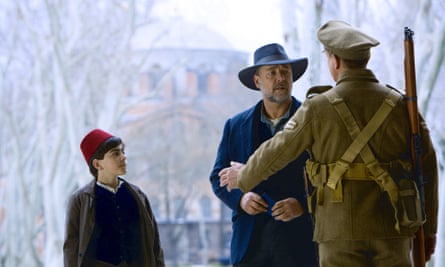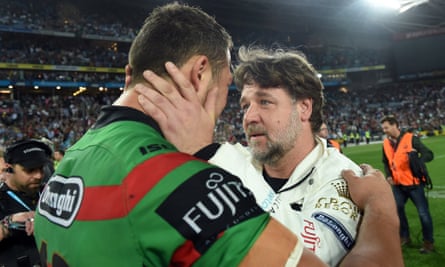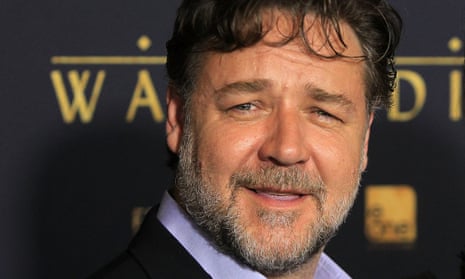Russell Crowe, like a lot of us, is sick of commuting. “I commute to work and it is a long commute and sometimes it can be really tedious,” says the 50-year-old. “As the years go by, it is more and more of a problem for me – it doesn’t feel natural for me to get on a plane anymore.” Which explains, in part, why we are here, at the end of 2014, talking about his directorial debut.
The Water Diviner stars Crowe as Joshua Connor, an Australian farmer whose three sons have been killed at Gallipoli. Connor’s wife, unhinged by the loss, blames him for not protecting them – for letting them go. When she dies, he promises her that he will bring them home.
It is a visceral, powerful, visually ravishing film, occasionally mawkish, sometimes less than plausible – but it’s hard not to be moved by the picture it paints of an entire generation of colony boys wiped out before their time.
Wherever he has been in the world, Crowe has been an assiduous attendee of “dawn services” – Anzac memorials for the early morning landing at Gallipoli in 1915. “It is part of who I am,” he says. “I even created a dawn service on the set of A Beautiful Mind when we had been working through the night.”
It was working with the likes of A Beautiful Mind director Ron Howard, Ridley Scott (Gladiator) and Peter Weir (Master and Commander) that influenced Crowe’s own approach as a director, a role he seems to have tackled like a general planning a military campaign.
The cast of The Water Diviner were put through nine-hour auditions and a boot camp that included 50km bike rides. Crowe wanted to create an energy around him, he says, but before he got to set, it was all theory. “Until I applied it, I really couldn’t have told you with any level of confidence whether it was going to work or not.
“I have worked with people who have just run the car into the wall, who don’t know that part of their job is to make sure there is an emotional and physical health within their crew. As much as I have learned what I want to do, I have also learned what I am never going to do.”

Maintaining the balance meant bike rides, yes, but it also meant playing David Bowie’s Golden Years as his crew reset between shots in a dingy marketplace in Istanbul. Using music to change the mood when things aren’t going to plan during filming is a trick he “nicked” from Peter Weir, he adds.
Taking the directorial helm was not just a career risk for Crowe – it was a “big life risk”. If The Water Diviner proves commercially successful, he will be able to bring back other films to direct in Australia, to “work in the city I want to work in” and, crucially, be more present for his sons, Charlie, 10 and Tennyson, 8.
An actor, even an Oscar-winning one, does not usually have that level of control, he says. “People go: ‘You are a movie star – surely you can call those shots.’ But I am not that kind of an actor. I look for the role that excites me and work with whoever that director happens to be, wherever he wants to shoot the film.”
It wasn’t always the case. At the age of 27, Crowe had made five small Australian movies and was a study in agitated energy. Already uncompromising, intense, angry and in a hurry, he was burning up. Never, he said in an interview at the time, would he “fake sincerity”.
“I look back on the things that came out of my mouth and I am floored by the audacity and confidence,” Crowe says now of his young self. But heading into the headlines as a combustible movie star was not an easy passage. “It took a long time ... I would get close to things but never get stuff.”
Going into Gladiator, the film that would make him a Hollywood name, people still talked to him of “wasted” career opportunities. “They might not have said it in so many words but in the course of meetings they would say: ‘Oh well, you will always have LA Confidential.’”
Contrary to appearances, when Crowe’s subsequent public outbursts were telegraphed around the world, he did care what people thought of him, most of all family and friends in Australia. “I never took any of the smoke being blown up my arse as being serious,” he says. “Even through the largest periods of success in my life, my principle aim – when I finish the job – has always been to get home. To go to the bush and, more recently, to be with my kids.”
At Crowe’s farm on the north coast of New South Wales, his family do not see a movie star. “If it’s Mum, she will call me Russ, if it’s my dad he will call me Rusty, if it’s my brother he will call me ‘arsehole’.” And all his beloved horses ask for is some nice hay. “They only care if your touch is gentle when you brush them down, and if your voice is patient.”
Then there’s his sideline: sport. It’s easy to draw parallels between the frustrating slow burn of Crowe’s early acting career (and the eventual glory of his Oscar) and the rugby league team he co-owns, the South Sydney Rabbitohs, who won the Australian grand final in 2014 for the first time in 43 years.

“I daydreamed that moment since the last time they won when I was seven – probably more intensely in the last nine years since we took over ownership,” says Crowe. “You have to be patient with these big dreams.” But when the moment came, his reaction – that white jacket in the crowds – seemed remarkably calm.
“I didn’t do any of the things I thought I might do. I wasn’t shouting or yelling or dropping to my knees in a prayer of thanks. What came over me at that point was a very deep simple feeling of a job done. I shook [co-owner] Peter Holmes à Court’s hand, I looked at his hair, and I realised for the first time his hair is now grey and my beard is grey.”
It had been a long journey, says Crowe, “and I found my enjoyment of that moment was deep and it was quiet”.
And calling his own shots as a director has been similarly revelatory. “Directing is like looking at the stars on a cloudless night,” he says. “You get away from all light sources and you look up and you see 50 points of light. And a minute later 100 and another minute later 1,000 and then 10,000. And then this swirling gigantic carpet above you and somehow it all seems to connect.”

Comments (…)
Sign in or create your Guardian account to join the discussion